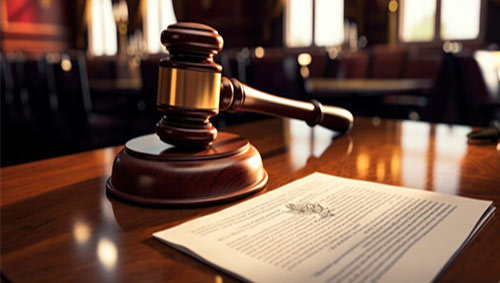-
Talk to Us: 94903 72354 | 94415 15253 / info@mountcarmelhyd.com

-
Reach Us: Survey#138, Badangpet, Hyderabad, Telangana

THE 51st PERSON ON THE CHAIR

THE APPOINTMENT, RETIREMENT AND ROLE OF: The Chief Justice of India (CJI)
The Chief Justice of India (CJI) occupies a pivotal position within the Indian judiciary, serving as the head of the Supreme Court, the highest court in the country. This role carries significant responsibilities in judicial, administrative, and public domains, reflecting the importance of the judiciary in upholding the Constitution and maintaining the rule of law.

The appointment of the chief justice
presidential appointment
The appointment of the CJI is
formally made by the President of
India. However, this is done in
accordance with established
conventions, primarily focusing on
seniority among the judges of the
Supreme Court. The outgoing CJI
typically recommends the next
senior-most judge for the position,
reinforcing the principle of
seniority in judicial appointments.
THE COLLEGIUM SYSTEM
The collegium system, established through judicial
pronouncements, plays a critical role in the
appointment process. The collegium consists of the
CJI and the four senior-most judges of the Supreme
Court, who collectively decide on judicial
appointments and transfers. This system is intended
to maintain the independence of the judiciary from
political influences and to ensure that qualified and
competent individuals are appointed.
Consultative process
While the final decision rests with the
collegium and the President, the process
involves consultations with various
stakeholders, including the outgoing CJI and
other senior judges. This consultative process
aims to ensure that appointments are made
based on merit, experience, and suitability,
rather than political considerations.
Judicial
independence
he appointment process, particularly the
collegium system, has been the subject of
debate and scrutiny. Critics argue that it lacks
transparency and accountability. Proposals for
reform have included greater involvement of
the executive in the appointment process.
However, advocates emphasize the importance
of maintaining judicial independence and the
need to avoid political interference in judicial
appointments.


SANJEEV KHANNA APPOINTED
ASTHE NEW CJI OF INDIA: OATH
TO BETAKEN ON 11th NOV.
As the retirement age for the
Chief Justice, like other
Supreme Court judges, is 65
years. This ensures that the
judiciary benefits from the
wisdom and experience of
senior judges while also
allowing for regular turnover
and the infusion of new
perspectives within the
Supreme Court. The CJI DY
CHANDRACHUD retires.
Sanjeev khanna appointed as
the new CJI on NOV 8th
Former CJI DY
CHANDRACHUD announces
retirement as his tenure is
about to end. The retirement
of the Chief Justice of India is
a significant event in the
judiciary, marking the end of
one chapter and the
beginning of another. It is a
moment for reflection on the
contributions of the outgoing
CJI and the future direction
of the Supreme Court under
new leadership.
THE ROLE OF CJI IN THE JUDICIARY
Judicial authority
The CJI presides over court proceedings and has
the authority to allocate cases to various benches,
which can include both constitutional benches
dealing with significant legal issues and smaller
benches for routine matters. The CJI often hears
some of the most critical cases in the country,
including those involving constitutional questions,
human rights issues, and major public interest
litigations. The ability to prioritize cases and
manage judicial workload effectively is crucial for
the efficient functioning of the Supreme Court.
Administrative
Functions
Beyond judicial duties, the CJI plays a central role in the
administration of the Supreme Court. This includes the
appointment and transfer of judges within the higher
judiciary, including High Courts, which is done through
the "collegium system." The CJI, along with four seniormost judges, recommends appointments to the
President of India, ensuring that qualified individuals
are selected for judicial positions. The CJI also oversees
the functioning of court staff and infrastructure,
ensuring that the judiciary operates smoothly and
efficiently.
Leadership & Representation
As the head of the judiciary, the CJI is a key figure in maintaining
judicial independence and integrity. The CJI represents the
judiciary in its relations with the executive and legislative branches
of government, advocating for the autonomy of the judiciary and
the importance of the rule of law. This role is vital, especially in
times of political tension, as the CJI must assert the judiciary's
independence while navigating complex relationships with other
branches of government.
Advisory role
The CJI has a significant advisory role in judicial appointments
and legal matters of national importance. The President of India
consults the CJI when appointing judges to the Supreme Court
and High Courts. Additionally, the CJI may be called upon to
provide legal opinions or guidance on constitutional matters and
legislative issues, helping shape the legal landscape of the
country.
Guardian of Fundamental Rights
The CJI plays a critical role in upholding and protecting fundamental
rights enshrined in the Constitution. The Supreme Court, under the
leadership of the CJI, often hears cases that challenge the
constitutionality of laws and executive actions, thus serving as a
bulwark against arbitrary governance and protecting civil liberties
By: Tanush.M
Grade: 11th CEC
10 Nov 2024
